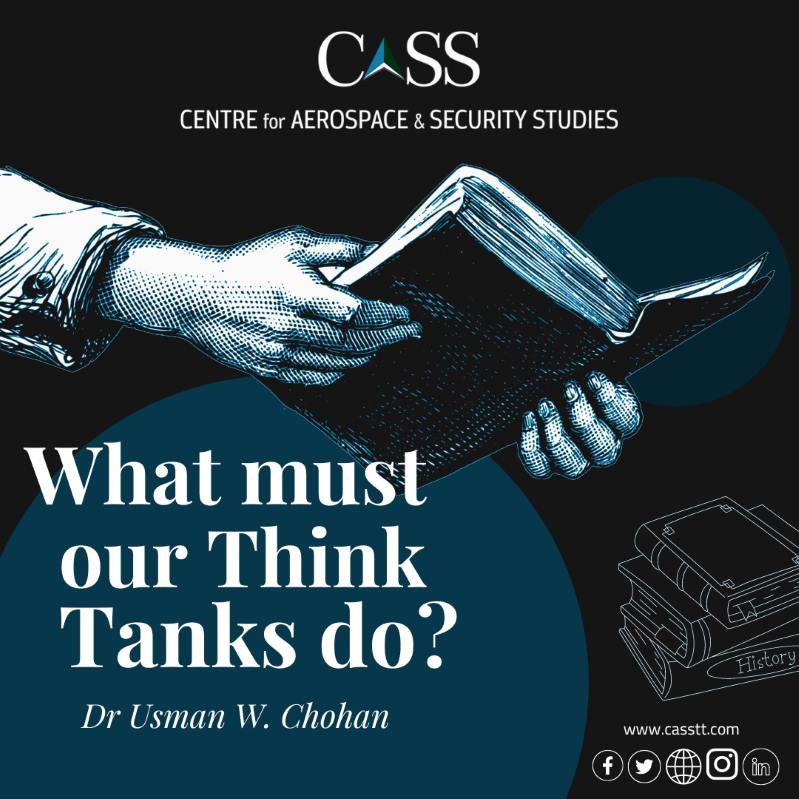Think tanks are deemed to play an important role in the process of addressing the multidimensional problems that confront complex societies. In the city of Islamabad alone, there are at least 30 think tanks that focus on a wide range of research disciplines and policy domains. Although they might vary in size and in scope, they all attempt to produce regular research outputs that might inform the thinking of both specific institutions as well as the general public.
Think tanks also hold regular events to invite experts and select members of the public to share their thoughts and provide inputs, and they often disseminate the takeaways of such gatherings in written form. The coronavirus pandemic has led to a migration of such events to the virtual (webinar) format, but the change of medium hasn’t detracted too much from the objectives of think tanks as a whole.
Yet insofar as there is a continued churning of research outputs during this coronavirus pandemic, the lockdown also offers a moment of reflection about the general direction in which think tanks are headed, especially in Pakistan.
At the very outset, it should be noted that there are certain structural issues that impede the potential that think tanks might have to begin with. These include: a low literacy rate, low public engagement, and a high power-distance cultural trait. This suggests prima facie that the challenge facing our think tanks is substantial.
That said, it may help to frame the role of our think tanks in terms of what Daniel Drezner once termed the “Ideas Industry.” Drezner’s premise was that the “marketplace for ideas” has fundamentally shifted over the past two decades, and now no longer favoured the “public intellectual,” but begun to show a penchant for “thought leaders” instead.
The three main distinctions between the public intellectual and the thought leader are (1) depth, (2) objective, and (3) critique. On the first point, public intellectuals would know much about a great many things, while thought leaders would be characterised by a single “great idea.” On the second point, public intellectuals would also often have their fame thrust upon them, but not go about actively building a personal “brand,” while thought leaders would market themselves and actively cultivate fame.
On the final point, traditional public intellectuals would actively engage in the exercise of critique, “ready to explain why some new policy idea is unlikely to work,” while thought leaders would have “a positive idea for change and the conviction that they can make a difference,” in Drezner’s words.
In today’s climate, Drezner laments that these are “the best of times for thought leaders” and “the worst of times for public intellectuals,” and he attributes this to: (1) a lack of trust in authority figures and experts (as exemplified by Trump’s fake news or Modi’s propaganda), (2) a flourishing of social media and its heterogeneity of viewpoints and speed of delivery, and (3) an increased polarisation of politics that is mirrored in society at large.
The tension between thought leaders and public intellectuals is not particularly new, and the early 20th century social scientists Max Weber and Antonio Gramsci both alluded to the problem of academicians and intellectuals struggling as leaders in the public sphere. However, today the problem has become worryingly acute, with thought leaders’ bite-sized factoids and their Ted Talks carrying the day over public intellectuals by a wide margin.
An ideal society, according to Drezner, would have a marketplace for ideas that could strike a reasonable balance between both types. Otherwise, with too many public intellectuals, it would become too difficult for new concepts to emerge since most ideas would simply be struck down. Conversely, too few public intellectuals would mean that bad ideas would take too long to die out.
In the context of American think tanks, Drezner has observed that traditional houses such as the Council on Foreign Relations and Brookings Institute have been comparative losers, while hyper-partisan think tanks such as the Heritage Foundation have been winners. Funding, social media, and partisan politics have intensified that problem.
The situation is not helped by the fact that numerous American public intellectuals, such as the notorious Fareed Zakaria, have been repeatedly found guilty of plagiarism and factual errors in their work.
So, what must our think tanks do in such a context? Taking a cue from Drezner’s argumentation, it may help to frame the purpose of the modern think tank as one of synthesis and balance between both public intellectual and thought leader.
On one hand, think tanks must develop specialisations, engage in charismatic advocacy, while also cementing an institutional brand, à la thought leader. On the other hand, they must remain attentive to shifting global and local dynamics, and provide meaningful inputs on a diversity of issues, while contributing meaningful critique of social challenges, à la public intellectual.
Such a balance would not be easy to strike, of course, because the tendencies of each role veer towards opposing performative and constructive approaches. Indeed, the effort may backfire and lead to a think tank embodying the failures of both: neither able to appeal to the public, nor able to deploy rigor.
That said, any think tank that manages to effectively draw upon (1) the thought leader’s flair for branding, dissemination, and specialisation; as well as (2) the public intellectual’s penchant for dispassionate deconstruction; would come to tower over its peers and fulfil a meaningful intellectual duty towards both decision-makers and the public at large.
That balance is, I believe, the ambition that Pakistan’s think tanks must harbour.
– The writer is the Director for Economics and National Affairs at the Centre for Aerospace and Security Studies (CASS). This article was first published in The Nation newspaper. He can be reached at cass.thinkers@gmail.com.




